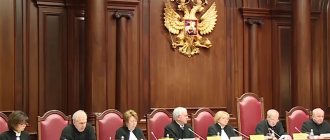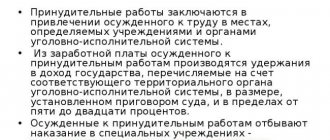On what issues can you contact the Constitutional Court of the Russian Federation?
An application to this institution is formed on the basis of numerous and strict rules.
Typically, citizens file a complaint with the Constitutional Court on the following grounds:
- a citizen cannot exercise his constitutional freedoms and rights due to current regulations and laws;
- doubts arise regarding the compliance of laws or acts with the provisions of the Constitution of the Russian Federation;
- a citizen wants to hold representatives of government agencies accountable, since they carry out actions that do not fall within their competence and position.
When drawing up a complaint, only relevant personal information is indicated, and links to regulations are also provided. Only data that cannot be disputed are provided.
Free legal consultation
+8 800 100-61-94
Individuals represented by Russian citizens, as well as foreigners who reside in the territory of the Russian Federation on the basis of official permission, can apply. Additionally, the applicants are business owners who have encountered violations of their rights during cooperation with government authorities. Even representatives of government authorities at different levels can file a complaint.
Important! It is allowed to submit collective appeals if the rights of all members of one team are violated by the provisions of a particular norm.
After considering this application, the judge may make different decisions:
- leaving a document without consideration because it was drawn up with violations or contains false information;
- making a decision on a complaint without holding a court hearing;
- consolidation of several investigations into one case;
- conducting a trial.
All well-formed complaints are considered at a meeting. At least 2 thirds of the judges must participate. Additionally, the applicant and the defendant are summoned. If necessary, experts, witnesses and other persons are involved in the proceedings. Applications that are carelessly drawn up or do not comply with the standards will not be accepted for processing.
The constitutional judge may require from the applicant or respondent additional materials relevant to the case. If necessary, he calls in specialists to provide clarification on certain issues. In this case, the meeting can be open or closed.
It is also useful to read: Online voting for amendments to the Constitution
Drawing up a complaint
The chances that an ordinary citizen will be able to independently cope with the preparation of a complaint to the Constitutional Court are extremely small. Therefore, we recommend that you seek help from a qualified lawyer.
Our consultation can only give a very general idea of the procedure and the ability to navigate the complex process of drawing up, filing and considering a complaint.
There are several rules for preparing for proceedings in the Constitutional Court, namely:
- the applicant himself must notify the persons involved in his complaint and give them copies of the complaint;
- The complaint submitted to the Constitutional Court must be literate, correct, unemotional and not contain corrections or additions.
The text of the complaint must contain the following information:
- name of the Constitutional Court and its address. We inform you that the Constitutional Court of the Russian Federation is stationed in Moscow and St. Petersburg;
- Full name, address, contact details of the applicant;
- Names and addresses of persons involved in the complaint;
- information about the event that served as the basis for applying to the Constitutional Court;
- information about the appeal procedure completed before applying to the Constitutional Court;
- a reference to the article of the Constitution that, in the applicant’s opinion, was violated;
- links to regulations;
- a request to the Constitutional Court to verify the subject of the complaint for compliance with the Constitution;
- date of application and signature of the applicant.
The following documents are attached to the complaint:
- a decision of an executive, legislative or judicial authority, which the applicant requests to check for compliance with the Constitution;
- decisions of the authorities in which the original act was contested by the applicant;
- power of attorney if the complaint is filed by a representative;
- a copy of the applicant's passport;
- receipt of payment of state duty.
How to apply to the Constitutional Court correctly for an individual
In order for a document to be accepted for consideration, clear requirements are taken into account during its preparation. Based on Art. 36 of the Federal Law on the Constitutional Court, the reason for starting a trial is the receipt of a complaint, request or petition that meets the requirements of the law.
General requirements include:
- the complaint must be submitted exclusively in writing;
- signed by the applicant;
- personal information about the compiler, provided by his full name and residential address, is indicated;
- if the applicant is a legal entity, then the name and legal address of the enterprise is provided;
- the circumstances of the case presented as the basis for writing the complaint are listed;
- the requirements of the compiler are given;
- links are provided to regulatory documents on the basis of which the applicant has the right to file a complaint;
- the documents attached to the application are listed;
- The date the request was generated is indicated.
It is advisable to use the help of a professional lawyer when drawing up a document, since even minor errors or inaccuracies are grounds for refusal to consider the complaint.
Example of a complaint:
Conditions of treatment
The procedure for accepting an application for consideration by the Constitutional Court is in many ways similar to the procedure for admission to the European Court of Human Rights (ECHR).
At the initial stage, the Secretariat of the Constitutional Court checks the admissibility of the complaint for consideration. The complaint will be accepted for consideration if:
- its subject falls within the competence of the Constitutional Court of the Russian Federation;
- the author of the complaint has passed all the required appeal procedures, including supervisory;
- the complaint contains sufficient argumentation;
- the complaint was filed within a one-year period from the date of the last decision in the appeal procedure.
What documents are attached to the application?
Other documentation is attached to the official application sent to the Constitutional Court.
These include:
- an act or other document that needs to be checked for compliance with the provisions of the Constitution;
- a receipt for payment of the state duty, with individuals paying 450 rubles, and business representatives must pay 6,750 rubles;
- if a person whose rights have been violated uses the help of a representative, then a notarized power of attorney containing a list of delegated powers is required;
- if the compiler is a foreigner, then he creates the text in his native language, but in addition the document is translated into Russian;
- other materials serving as evidence of the applicant’s correctness.
Attention! All documents are transferred to the representative of the Constitutional Court in a single copy.
Some individuals receive a fee waiver. These include Heroes of the Russian Federation or the USSR, former prisoners of concentration camps, holders of the Order of Glory and participants of the Second World War. Documentation is accepted not only on paper, but also in electronic form.
No obscene language, slang, insults or threats are allowed. Only a business style is chosen, and the material must be presented sequentially so that the judge can understand the problem.
Separately about the state duty
Issues of payment of state fees for complaints addressed to the Constitutional Court of the Russian Federation are regulated by Art. 333.23 Tax Code of the Russian Federation and Art. 39 of the Law of the Russian Federation “On the Constitutional Court of the Russian Federation”.
Expert opinion
Kozlov Andrey Kirillovich
Lawyer with 10 years of experience. Specialization: criminal law. More than 3 years of experience in developing legal documentation.
The amount of the state fee varies depending on the status of the applicant. Thus, for legal entities the state duty will be 6,750 rubles, and for individuals – 450 rubles.
The Constitution of the Russian Federation states that every citizen has the legal right to protect his interests in the courts. Alas, even today, the efficiency of some representatives of this system is far from perfect.
Of course, to appeal a decision, you can file an appeal, cassation or supervisory complaint, but what to do if none of these measures brought the desired result?
The answer to this question is to appeal to the Constitutional Court of the Russian Federation. This structure is a separate authority that protects the interests of citizens. The court is located in St. Petersburg, and its representative office is in Moscow.
The judiciary of the Constitutional Court consists of 12 judges. The main condition for hearing a case is the presence of at least 8 judges at the trial. In cases where there is complete information about the case, there is no hearing and the verdict is reached behind closed doors.
As practice shows, an attempt to independently understand the peculiarities of the legislation and draw up a complaint to the Constitutional Court without the help of an expert often ends in failure. Due to a minor mistake made by accident, the application is refused to be considered, and everything has to start from the very beginning.
A timely contact with an experienced lawyer will allow you to avoid mistakes and correctly draft a complaint. A professional, thanks to his extensive theoretical knowledge and many years of practical experience, will be able to help with writing an application and also give practical recommendations on the case.
You can quickly obtain the necessary information while avoiding additional financial costs by seeking an online consultation. An undeniable advantage of the remote method of communication with a specialist is also its accessibility.
There is no need to take time off from home or work, travel to the other end of the city or stand in line for a long time. All you have to do is visit our website or just call us.
Procedure and methods for submitting an application
There are several ways in which a complaint is brought before a judge. These include:
- personal visit to the CS reception room;
- sending documentation by mail, but for this purpose only a registered letter is used with a list of the contents, declared value and acknowledgment of delivery;
- It is allowed to use the electronic form of the document, which is sent through your personal account on the CC website.
If an electronic format is selected, then through your personal account you are additionally offered the opportunity to track the progress of the complaint. First, 3 days are given for the documentation to be checked by secretariat employees. They must make sure that the papers and information provided are reliable and that the documentation is correctly completed.
If violations are discovered, the applicant can make corrections, and if the citizen does not respond to the demands of representatives of the Constitutional Court, then his complaint is canceled.
The applicant must prepare for the court hearing at which all appeals are considered. Typically, a hearing on a claim is scheduled three months after the complaint is registered. The decision is made by a panel of judges within a few hours.
If it is positive, then this leads to the following consequences:
- a norm that has lost force is considered appealed;
- the court decision or any of its clauses is annulled;
- a new regulatory act is adopted;
- a case is reviewed on the basis of the provisions of the Constitution.
Reference! Sometimes, directly during the proceedings, the judge suspends the operation of the disputed law or act until a decision is made.
Useful video
Advice from a lawyer on applying to the Constitutional Court:
Motion of complaint
A complaint to the Constitutional Court of the Russian Federation is submitted through the Secretariat of the Constitutional Court, which examines the received complaint to identify errors. Moreover, the Constitutional Court, unlike the courts of first instance, is extremely disloyal to errors and inaccuracies in the complaint. The presence of lacunae in the design entails a refusal to accept and the return of the complaint to the applicant.
The complaint, which has passed the check of the Secretariat, is accepted for preliminary consideration and transferred to the judge of the Constitutional Court for study.
After the examination procedure, which can last up to 3 months, the Constitutional Court sets the case for consideration on a specific date. However, the fact that a complaint has been accepted does not mean that it will necessarily be considered. At any time, the complaint may be withdrawn from consideration and returned to the applicant.
Stages of consideration of a case in the Constitutional Court
After filing a complaint, the applicant should be patient and prepare for a lengthy legal process, which includes several stages:
- Submitting a claim to the Secretariat . This stage involves a detailed study of the document, searching for errors and inaccuracies. If defects are identified, the complaint is returned to the plaintiff for correction. The procedure is repeated until all inaccuracies are eliminated.
- Preliminary examination of the application . This procedure is carried out by several judges. The petition is studied, subjecting all facts and circumstances to a thorough analysis, after which a decision is made on its admission to consideration. The preliminary review stage can last up to 3 months.
- Court hearing . This stage has the same features as the consideration of the case in the primary court.
- Adoption of the verdict and its publication . Some time after the hearing is completed, the court will issue a ruling. Participants in the proceedings will be called into the courtroom, where the verdict will be announced. After approval of the resolution, it will be published on the website of the Constitutional Court of the Russian Federation, and paper copies will be sent to the participants in the process.
- Clarification stage . The court rarely gives any comments on the case. In most cases, the decision of the Constitutional Court is perceived as extremely clear, legal and does not require explanation or appeal.
Refusal to consider the case can come at any stage, so it is recommended to file a complaint with the help of a competent lawyer. A specialized expert will tell you how to draw up a document correctly, and, if necessary, will independently resolve all issues.









